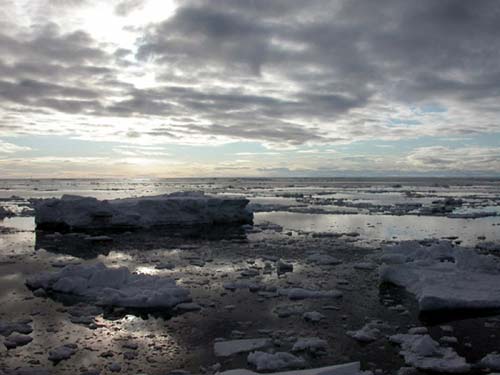 Northern sea ice continues
to shrink
Northern sea ice continues
to shrink
By Ned Rozell
May 02, 2007
Wednesday
Since 1979, the first year we were able to look at sea ice from
above with satellites, scientists have never seen less ice floating
on the northern oceans at this time of year.
"This April (2007) has the lowest sea ice extent on record
of any April we've seen before," said Mark Serreze, a sea-ice
specialist and senior research scientist with the National Snow
and Ice Data Center in Boulder, Colorado. "We're setting
ourselves up this summer for a very large ice loss."
Serreze's observation comes at a time when he and his colleagues
have written a paper in which they concluded that northern sea
ice could disappear much earlier than computer models suggest.
 Sea ice floating offshore
of Gambell.
Sea ice floating offshore
of Gambell.
Photo by Ned Rozell
"We're a good 30 years ahead in ice loss than what the models
are showing," said Walt Meier of the University of Colorado.
"Instead of losing ice in summer near the end of this century,
it might occur before 2050."
Meier's colleague Julienne Stroeve is the main author on a paper
titled "Arctic sea ice decline: Faster than forecast,"
published May 1 in Geophysical Research Letters. They found that
during the past 50 years, arctic sea ice has been disappearing
three times as fast as the average rate of loss that computer
models have shown.
If, in some not-too-distant summer, we lose northern sea ice,
polar bears will almost surely be doomed, or at least pushed
onto land where biologists think grizzlies will out-compete them.
The fabled Northwest Passage shipping route would open the far
north to shipping travel. And more open water would absorb heat
that the ice reflected, adding warmth to the Arctic and places
far from the Arctic. In winter, sea ice will always be present
to some extent because the Arctic is such a cold place.
Some of the warming that has led to a smaller ice pack on top
of the world is due to greenhouse gases and some is due to natural
processes, said John Walsh, chief scientist at the International
Arctic Research Center at the University of Alaska Fairbanks.
"The system has been given a kick," he said. "Something's
pushing it away from the past climate state."
Along with the effects of our increased emissions of carbon dioxide
and other greenhouse gases, a natural process called the Arctic
Oscillation also impacts the amount of northern sea ice.
"In the early 1990s, winds associated with the Arctic Oscillation
pushed older, thicker ice out of the Arctic (where it melted),"
Walsh said. "The Arctic Ocean never recovered from that
in terms of thickness of ice, and the edge has retreated even
more because thinner ice melts easier in the summer."
The Colorado scientists think global climate models -supercomputers
that try to simulate Earth's conditions - might be lagging behind
reality when it comes to disappearing sea ice because it's hard
for modelers to include the effects of sea ice's reflection of
sunlight and to account for warm water pulses from the Atlantic
that affect the ice from below.
Igor Polyakov is a scientist at the International Arctic Research
Center who leads a program of scientific cruises to the Arctic
Ocean in which scientists discovered these warm pulses of water
(http://www.gi.alaska.edu/ScienceForum/ASF17/1754.html).
"The impact of oceanic heat on ice is a very important part
that was largely ignored before (in the models)," Polyakov
said.
With instruments they have attached to moorings throughout the
vast Arctic Ocean, Polyakov and his colleagues are tracking this
warm water from the Atlantic as it circulates. They believe that
warm water is in part responsible for April's record low ice
extent, because the warm pulse of water is now in the Eurasian
part of the Arctic Ocean, where much of the ice is missing this
spring.
This column is provided
as a public service by the Geophysical Institute, University
of Alaska Fairbanks, in cooperation with the UAF research community.
Ned Rozell [ nrozell@gi.alaska.edu
] is a science writer at the institute.
Publish A Letter on SitNews Read Letters/Opinions
Contact the Editor
SitNews
©2007
Stories In The News
Ketchikan, Alaska
|



